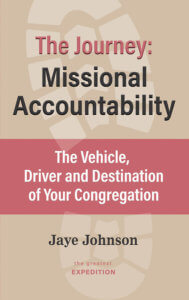Tiredness and burnout in church leadership occur primarily because leaders over-function, micromanage, or are placed in roles that do not use their God-given spiritual gifts. Jaye Johnson says the antidote is to reclaim the passion that comes when one leads out of one’s own unique giftedness.
I run into many church leaders, clergy and laity, who tell me they are tired. They are ready for someone else to take on the responsibilities of running the church. Some of them mean it!
And yet tiredness is a symptom of over-functioning. “Being tired and being effective are far from the same thing,” claims Gil Rendle in his book, Quietly Courageous. “Tiredness can appear noble to anxious people who are comforted knowing that someone is working tirelessly on their behalf. However, being tired is not evidence of being a good leader. Tiredness is not necessarily evidence of wisely using limited human resources for purpose rather than for comfort.”
The risks of over-functioning
Church leaders often lead in a way that seeks to soothe people and keep them pleased rather than enticing them to join God’s call to redeem humanity. Refusing to take the easy way in favor of the right way is crucial. If seeking new things ceases, congregations end up surrendering to the whims of people’s moods to keep them happy. This is a problem because, as Michael Slaughter puts it, “God gives big visions to people who are willing to take big actions! Leadership implements the risky strategic actions necessary to reach God’s place of promise. Doers are driven by visions and dreams and not by expectations or reprisals of people. They are compelled forward by truth, not motivated by the accolades of committees. Leaders do the right thing rather than the expected thing.”
Doing the right thing, not the easy thing, is so challenging that leaders get weary, causing people to second-guess their decisions. Tiredness can prevent leaders from accomplishing what is challenging yet necessary.
Leading out of duty or passion
Another source of tiredness is leading out of a sense of duty rather than out of our spiritual giftedness. One example of leading out of a sense of duty — of “ought”— can be found in numerous churches’ insistence on using clipboards and sign-up sheets. When a sign-up sheet is passed around to countless individuals, there is an overwhelming sense of guilt, causing people to sign up. On the one hand, this is an efficient way to get volunteers; on the other hand, it causes individuals to volunteer for ministry activities that they neither enjoy nor excel in.
At one church where I coached, it was common practice to pass around sign-up sheets to get liturgists to help lead worship. While this method efficiently recruited the necessary volunteers, many people signed up because they felt they ought to sign up; they did so out of a sense of duty and obligation, not because it was within their area of giftedness. This resulted in volunteers leading worship who were not called. These folks neither liked nor were even particularity good at serving in that capacity. Their lack of enthusiasm for the service they volunteered for was apparent. The result would have been drastically improved had that church prayerfully recruited three or four people who felt called to lead worship out of their gifts, rather than tapping into people’s sense of guilt.
The power of engaging spiritual gifts
Those who engage in a ministry because they feel they should burn out quickly, and their lack of passion infects the congregation. Tiredness and burnout in church leadership, both laity and clergy, occurs primarily because leaders over-function, micromanage, and are often placed in roles that do not use their God-given spiritual gifts. Leading out of your spiritual gifts energizes and leads to participation in God’s mission, but countless church leaders do not take the time to discover those gifts, and others are simply unaware of their gifts.
To abandon the “oughts,” your community of faith should seek to discover their passions, callings, and gifts and direct them toward making a difference in the world. As John Burke writes, “Spiritual gifts need to be pursued, discovered, and developed. As you do this, you’ll find they energize you and build up the Body to meet needs.”
 This material is excerpted from The Journey Missional Accountability: The Vehicle, Driver, and Destination of Your Congregation (Market Square Books, 2021) by Jaye Johnson. Used by permission. The book is also available at Cokesbury and Amazon.
This material is excerpted from The Journey Missional Accountability: The Vehicle, Driver, and Destination of Your Congregation (Market Square Books, 2021) by Jaye Johnson. Used by permission. The book is also available at Cokesbury and Amazon.
Related Resources
- How to Know When You Need to Ask for Help by Jessica L. Anschutz
- Acknowledging the Toll of the Pandemic on Ministry Leaders by Mike Bonem
- 4 Practices to Help Prevent Clergy Burnout by Matt Bloom and Kim Bloom
- Avoiding Lay Ministry Burnout by Marty Cauley







